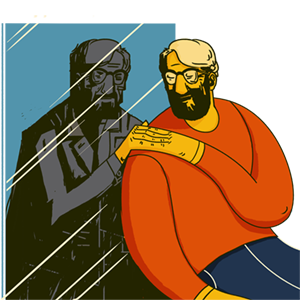New Narrative: Reflections on Life Writing and on Life (8/11)
Memoir: Deconstruction and Reconstruction of a Life Story
the axe for the frozen sea within us
In a previous piece, I cited a quote from David Chrisinger, “Don’t bother trying to rid yourself of trauma…Escaping trauma isn’t unlike trying to swim out of a riptide.”
Ironically, Kafka, also employing a water metaphor in relation to the written word, offers a more optimistic outlook. In a letter to a classmate, Kafka wrote, “We need books that affect us like a disaster, that grieve us deeply, like the death of someone we loved more than ourselves, like being banished into forests far from everyone, like a suicide.” Yes, doom and gloom are just what we’d expect from Kafka. But he goes on, “A book must be the axe for the frozen sea within us. That is my belief.”
Kafka sees our humanity worse off than merely trapped in a riptide. He sees us locked in the vice grip of an inner frozen sea. But he also offers hope! A book, a story, a narrative can and should affect us like a disaster, but it can also rescue us and set us free. I wonder what Kafka had in mind.
Indulge me while I exercise a bit of poetic license.
As I write, I observe patterns. I see how my reaction to a situation when I was four (or my mother’s or my sister’s or my brother’s reaction to that situation), informed my reaction to a similar event when I was seventeen or thirty-nine or fifty-two. I realize that rather than a chronological approach, a thematic way to tell my story is most effective. I rearrange the plot points. The molecules of my narrative undergo restructuring. The order of my life changes. Rather than recalling myself at five, then six and so on, I recall a theme. I see myself at four, seventeen and thirty-nine on a stage in a theater, always the same stage in the same theater. I act out scenes with names like rebellion, religion, sex, death, silence.
Perhaps, the frozen sea within us is the aggregate of our experiences, emotions, pains and traumas, a frozen prehistoric mass within us. And maybe our writing is an axe, the tool we use to smash and deconstruct that aggregate so that we can then sort and identify its components, and reconstruct them into a book, into a narrative whose pieces were there the whole time, but that unprocessed, has frozen us in place.
I admit that I have no idea how Kafka would have extended his axe metaphor. I know that this interpretation is a stretch, an almost rabbinic-like commentary. But remember what I once was and no longer am not. I was once a yeshiva student who for five years studied Talmud for hours a day.
Read next: Does Writing about Life Make Us Wiser?


